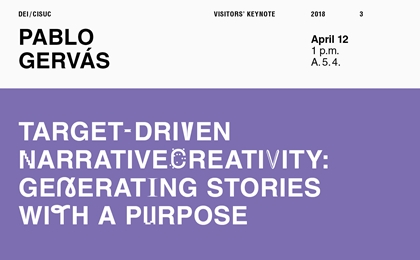
Visitors' Keynote - Pablo Gervás

Target-Driven Narrative Creativity: Generating Stories with a Purpose
April 12
1h00 p.m.
Room A. 5.4 - FCTUC-DEI
Abstract: Storytelling is a fundamental human ability, very closely related to recording and communicating past experience. As such, it has been the focus of important research efforts in the AI scientific community. Automated story tellers have been developed that can generate story-like constructs. Some of these storytellers find a way to connect an initial situation to a desired outcome, by relying on planning technologies. Other storytellers simply generate a valid story, without taking into consideration any particular constraint. Although human authors can do both of these things, most instances of storytelling as carried out by humans differ from these extremes. Human authors either tell as a story a set of events that they have observed or make up a story to fulfill a particular purpose. These are options that have not been explored in as much detail within the community researching on computational narratology. Yet they are much closer to the important functions of recording and communicating experience. My talk will review existing storytelling systems, consider how close they come to implementing these target-driven modes of storytelling, and what would be required for them to address them better. An important question to consider is whether the addition of constraints on the output to be produced makes creativity more difficult or more likely.
Short Bio: Pablo Gervás is Associate Professor at the Department of Software Engineering and Artificial Intelligence of the School of Informatics at the Universidad Complutense de Madrid. He is the director of the NIL research group (Natural Interaction based on Language) and of the Instituto de Tecnología del Conocimiento. Over the years, his research interests have shifted towards studying the role of narrative in human communication, with a view to applying it in human-computer interaction. Besides his generic interest in understanding and modelling language, he tries to tackle computational models of human creativity. His interests include the following lines of research: Natural language generation, Natural language analysis, NLP for accessibility, and NLP and literary artifacts.